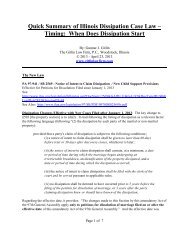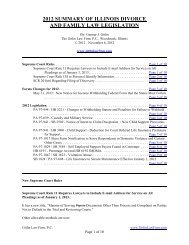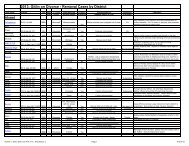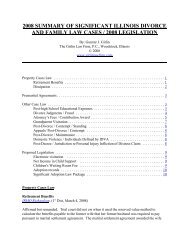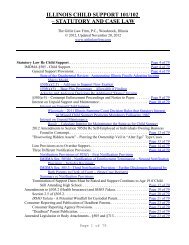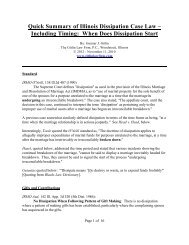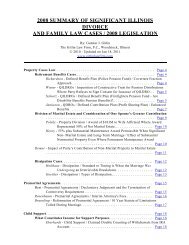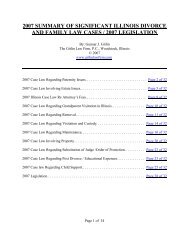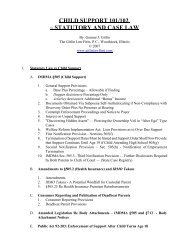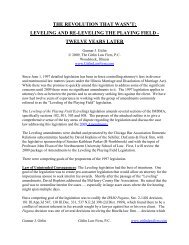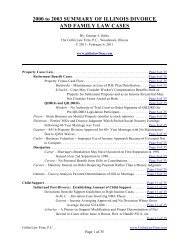Gitlin Law Firm 2010 Illinois Divorce and Paternity Case and ...
Gitlin Law Firm 2010 Illinois Divorce and Paternity Case and ...
Gitlin Law Firm 2010 Illinois Divorce and Paternity Case and ...
Create successful ePaper yourself
Turn your PDF publications into a flip-book with our unique Google optimized e-Paper software.
If a husb<strong>and</strong> refuses to give his wife a get, the wife becomes known as “agunah,” or<br />
“chained.” If an agunah were to marry again, this second marriage would not be<br />
recognized under Jewish law <strong>and</strong> tradition <strong>and</strong> the wife would be seen as adulterous.<br />
Any children of the second marriage would be considered “mamzerim,” or<br />
illegitimate.<br />
The former wife contended that the based on In re Marriage of Goldman, 196 Ill. App. 3d 785<br />
(1990), the ketubah that she <strong>and</strong> her former husb<strong>and</strong> had signed during their marriage ceremony<br />
formed a binding contract that required Earl to give her a get in the event that their civil marriage<br />
was dissolved. In six different pleadings the former husb<strong>and</strong> raised essentially the same argument,<br />
i.e., that IRMO Goldman did not apply. An interesting quote that could be taken out of context<br />
stated:<br />
Rule 137 is not a means by which the trial court should punish litigants whose<br />
arguments do not succeed; instead it is a tool which they can employ to prevent<br />
future abuse of the judicial process or discipline in the case of past abuses.<br />
Supreme Court Rule 137 states:<br />
The signature of an attorney or party constitutes a certificate by him that he has read<br />
the pleading, motion or other paper; that to the best of his knowledge, information,<br />
<strong>and</strong> belief formed after reasonable inquiry it is well grounded in fact <strong>and</strong> is warranted<br />
by existing law or a good-faith argument for the extension, modification, or reversal<br />
of existing law, <strong>and</strong> that it is not interposed for any improper purpose, such as to<br />
harass or to cause unnecessary delay or needless increase in the cost of litigation. ***<br />
The appellate court then stated:<br />
In the instant case, Earl repeatedly argued that this court’s decision in In re Marriage<br />
of Goldman, 196 Ill. App. 3d 785 (1990), upon which Jodi relied, was inapplicable<br />
<strong>and</strong> distinguishable on its facts. By our count, Earl raised this same argument in six<br />
different pleadings beginning with his initial motion to dismiss Jodi’s complaint <strong>and</strong><br />
ending with his reply to Jodi’s answer to his motion to reconsider <strong>and</strong> vacate the<br />
order of June 3, 2009. In each of these pleadings, Earl used similar language <strong>and</strong><br />
argument with minimal if any citation to case law. And each time, Jodi filed the<br />
appropriate responsive pleadings. Even though the trial court denied Earl’s motion to<br />
dismiss based upon his reading of Goldman, Earl continued to raise this argument as<br />
a defense to each <strong>and</strong> every action that Jodi <strong>and</strong> the trial court took in an attempt to<br />
bring the case at bar to resolution. Although not relevant to the issue of Rule 137<br />
sanctions, which deal only with pleadings, motions, <strong>and</strong> other papers filed with the<br />
trial court, Earl’s counsel repeatedly raised the same Goldman arguments at oral<br />
argument before the trial court.<br />
The appellate court then looked to the whether Goldman applied in determining whether sanctions<br />
<strong>Gitlin</strong> <strong>Law</strong> <strong>Firm</strong>, P.C.<br />
Page 44 of 49<br />
www.<strong>Gitlin</strong><strong>Law</strong><strong>Firm</strong>.com




